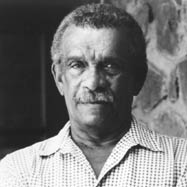
Online Texts for
Craig White's Literature Courses
|
Crusoe's Island (1965) by Derek Walcott
|
|
Discussion question(s): Engage this poem in dialogue with Robinson Crusoe and Claude McKay's "Enslaved." What different outcomes are imagined for the postcolonial encounter?
![]()
I
The chapel's cowbell
Like God's anvil
Hammers ocean to a blinding shield;
Fired, the sea grapes slowly yield
[sea
grapes=seaweed w/ clusters resembling grapes]
Bronze plates to the metallic heat.
5
Red, corrugated-iron
Roofs roar in the sun.
The wiry, ribbed air
Above earth's open kiln
[kiln = furnace or oven for burning, baking,
or drying]
Writhes like a child's vision
10
Of hell, but nearer, nearer.
Below, the picnic plaid
Of Scarborough is spread
To a blue, perfect sky,
Dome of our hedonist philosophy.
15
Bethel and Canaan's heart
Lies open like a psalm.
I labour at my art.
My father, God, is dead.
Past thirty now I know
20
To love the self is dread
Of being swallowed by the blue
Of heaven overhead or rougher blue below.
Some lesion of the brain
From art or alcohol
25
Flashes this fear by day:
As startling as his shadow
Grows to the castaway.
His Eden: 30
Goats, corn crop, fort, parasol, garden,
Bible for Sabbath, all the joys
But one
Which sent him howling for a human voice.
Exiled by a flaming sun 35
The rotting nut, bowled in the surf,
Became his own brain rotting from the guilt
Of heaven without his kind,
Crazed by such paradisal calm
The spinal shadow of a palm 40
Built keel and gunwale in his mind. [keel=lowest longitudinal timber of a ship or boat; gunwale=upper edge of ship's side]
The second Adam since the fall [Christ?
see 1 Corinthians 15:45]
His germinal
Corruption held the seed
Of that congenital heresy that men fail
45
According to their creed.
Craftsman and castaway,
All heaven in his head,
He watched his shadow pray
Not for God's love but human love instead.
50
II
We came here for the cure
Of quiet in the whelk's centre,
[whelk = mollusk with turbinate
shell--see photo below]
From the fierce, sudden quarrel,
From kitchens where the mind,
Like bread, disintegrates in water,
55
To let a salt sun scour
The brain as harsh as coral,
To bathe like stones in wind,
To be, like beast or natural object, pure.
That fabled, occupational
60
Compassion, supposedly inherited with the gift
Of poetry, had fed
With a rat's thrift on faith, shifted
Its trust to corners, hoarded
Its mania like bread,
65
Its brain a white, nocturnal bloom
That in a drunken, moonlit room
Saw my son's head
Swaddled in sheets
Like a lopped nut, lolling in foam.
70
O love, we die alone!
I am borne by the bell
Backward to boyhood
To the grey wood
Spire, harvest and marigold,
75
To those whom a cruel
Just God could gather
To His blue breast, His beard
A folding cloud,
As He gathered my father,
80
Irresolute and proud,
I can never go back.
I have lost sight of hell,
Of heaven, of human will,
My skill
85
Is not enough,
I am struck by this bell
To the root.
Crazed by a racking sun,
I stand at my life's noon,
90
On parched delirious sand
My shadow lengthens.
III
Art is profane and pagan,
The most it has revealed
Is what a crippled Vulcan
95
Beat on Achilles' shield.
[Iliad, book 18,
lines 478-608]
By these blue, changing graves
Fanned by the furnace blast
Of heaven, may the mind
Catch fire till it cleaves
100
Its mould of clay at last.
Now Friday's progeny,
[progeny = children, offspring]
The brood of Crusoe's slave,
Black little girls in pink
Organdy, crinolines,
105
Walk in their air of glory
Beside a breaking wave;
Below their feet the surf
Hisses like tambourines.
At dusk, when they return
110
For vespers, every dress
[vespers = evening prayers or
devotions]
Touched by the sun will burn
A seraph's, an angel's,
[seraph = one of seraphim,
highest class of angels, symbolized red for burning with
love]
And nothing I can learn
From art or loneliness
115
Can bless them as the bell's
Transfiguring tongue can bless.

whelk shells (line 52)
